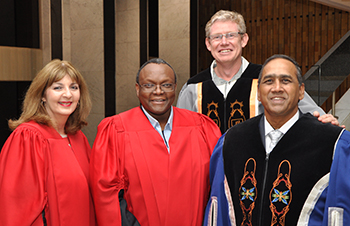Latest News Archive
Please select Category, Year, and then Month to display items
07 January 2018
Photo Charl Devenish
 Dr Anneke van der Spoel van Dijk is invested in contributing
to the global effort of stopping TB by 2035.
Dr Anneke van der Spoel van Dijk is invested in contributing
to the global effort of stopping TB by 2035.
The work of Dr Anneke van der Spoel van Dijk investigates the spread of TB in the Free State population using techniques such as next generation sequencing, spoligotyping and MIRU-VNTR typing. Dr Van der Spoel van Dijk, a senior medical scientist in the Department of Medical Microbiology at the University of the Free State (UFS) also looks at drug resistance in her research. This work informs decisions about how best to treat patients with multidrug-resistant TB (MDR-TB).
She employs rapid molecular techniques to track one of Africa’s most serious diseases, tuberculosis (TB).
Drug resistance
Scientists assist the National Health Laboratory Service and Department of Health in trying to refine the diagnostic tools to identify these cases earlier. Dr Van der Spoel van Dijk explains: “Until recently, it took up to two years to fine-tune treatment decisions for patients with MDR-TB. Patients get a cocktail of anti-TB drugs, but it takes time to find the right combination. Re-infection and relapse (patients stopping treatment for several reasons) add to the diagnostic and treatment management challenges.
Enormous impact
“Now doctors can reduce the time needed for diagnostic certainty to about seven days, while new drugs allow reduction of treatment from more than 18 to nine months. This can have an enormous impact on the life of many patients.”
Dr Van der Spoel van Dijk’s work forms part of research in the faculty looking at resistance development in TB strains. She is currently also doing her doctoral thesis on the differences and incidence of MDR-TB among adolescents versus adults. Dr Van der Spoel van Dijk says: “It is a complicated picture, but we hope to unravel it to support better diagnostic tools and patient care.”
As part of the National Health Laboratory Service, her department is playing an important role in TB diagnostics and the training of scientists and future pathologists. “Our work is contributing to the global vision to stop TB by 2035,” Dr Van der Spoel van Dijk says.
Prof Tim Murithi calls for Africa to design new global order
2016-06-02

From left: Prof Heidi Hudson, Head of Centre for Africa
Studies (CAS); Prof Tim Murithi, Extraordinary Professor
at CAS; Prof Lucius Botes, Dean of the Faculty of
the Humanities; and Prof Prakash Naidoo, Principal of
Qwaqwa Campus.
Photo: Stephen Collet
“What do Africans have to say about the remaking of the global order?” was the opening question of Prof Tim Murithi’s lecture which was hosted by the Centre for Africa Studies (CAS) of the University of the Free State (UFS) to celebrate Africa Day on 25 May 2016.
The annual Africa Day Memorial Lecture, entitled: Africa and the Remaking of the Global Order, doubled as Prof Murithi’s inaugural lecture. He is CAS’s newly-appointed Extraordinary Professor, as well as the Head of the Justice and Reconciliation in Africa Programme at the Institute for Justice and Reconciliation in Cape Town. He made a compelling argument for the need for Africa to exert an active influence on international narratives of peace, governance, justice, and reconciliation.
“If we are waiting for American leadership to get us out of the quagmire of a situation we are in, we will be waiting for a long time,” said Prof Murithi.
The Head of the Centre, Prof Heidi Hudson, concurred with Prof Murithi’s suggestion of devising African solutions for African problems. She quoted Audre Lorde’s well-known assertion that “The master’s tools will never dismantle the master’s house.”
Remembering 1963
Over five decades ago, on 25 May 1963, the Organisation of African Unity was formed, and was renamed the African Union in 2002. Africa Day marks this pivotal point in the continent’s history. On this day, we reflect on the continent’s journey into democracy, peace, stability and socio-economic development. It is also an opportunity to celebrate African identity and heritage.
Continent-building dialogues
The UFS Sasol Library celebrated Africa Day with a book launch. Facets of Power. Politics, Profits and People in the Making of Zimbabwe's Blood Diamonds by Tinashe Nyamunda is a reflection of some of the challenges that Zimbabwe continues to face. It details the disadvantaged position which the country finds itself in due to greed, maladministration, and corruption, despite possessing large deposits of minerals.
In celebration of Africa Month, CAS has held a series of lectures by esteemed scholars from across the globe. Earlier in the month, Prof Henning Melber presented lectures on Namibia’s independence and the African middle class. Kevin Bloom and Richard Poplak unpacked the issues surrounding Africa’s continental shift, while Prof Joleen Steyn Kotze focused on the possible fall of the African National Congress.